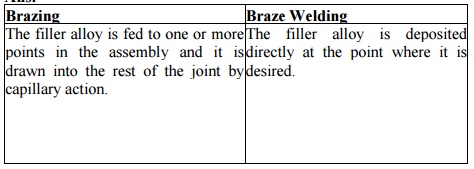Chapter: Mechanical : Manufacturing Technology : Metal Joining Process
Important Questions and Answers: Metal Joining Process
METAL
JOINING PROCESS
1 List out any four arc welding
equipment.
Ans: The most commonly used equipments
for arc welding are as follows:
(a)
A.C or D.C. machine
(b)
Wire brush
(c)
Cables and connectors
(d)
Ear thing clamps
(e)
Chipping hammer
2 What are the special features of
friction welding?
Ans:
•
Friction welding is a solid state welding process
where coalescence is produced by the heat obtained from mechanically induced
sliding motion between rubbing surfaces.
• The work
parts are held together under pressure.
• Its
operating is simple.
• Power
required for the operation is low.
• It is
used for joining steels, super alloys, non-ferrous metals and combinations of
metals.
3.Define resistance welding process.
Ans: Resistance welding is a
process where coalescence is produced by the heat obtained from resistance
offered by the workpiece to the flow of electric current in a circuit of which
the workpiece is a part and by the application of pressure.
4.What is
the purpose of flux? (May 2008)
Ans: 1) It acts as shield to weld.
2)
To prevent atmospheric reaction of molten metal
with atmosphere.
5. How can
slag inclusions in welding be avoided?
Ans: Avoid multi layer welding
•
Reduce arc length
•
Increase electrode angle
•
Avoid using large electrode
6. How does
brazing differ from braze welding?

Brazing
The
filler alloy is fed to one or more points
in the assembly
and it drawn into the rest of the
joint by capillary action.
Braze
Welding
The filler alloy is deposited
directly at the point where
it is desired.
7
Why flux is coated on filler rods?
Ans: The coating
improves penetration and surface finish.
• Suitable
coating will improve metal deposition rates.
8
What is the application of carburizing flame?
Ans:
•
Carburizing flame is generally used for: o Welding
of
low alloy
steel rods
o Non-ferrous metals o High carbon steel
9 What
are the diameter and length of the electrodes available in the market?
Ans: Standard length of electrodes are 250 mm, 300
mm and 450 mm.
•
Standard diameters of electrodes are 1.6,2 ,2.5,
3.2, 4,5,6,7,8, and 9 mm.
10.
Classify various ARC welding processes
(i)
Arc welding
•
Carbon arc
•
Metal arc
•
Metal inert gas
•
Tungsten inert gas
•
Plasma arc
•
Submerged arc
•
Electro-slag
11.
Classify various GAS welding processes
(ii) Gas
Welding
•
Oxy-acetylene
•
Air-acetylene
•
Oxy-hydrogen
12.Name the various methods of Resistance Welding
BUTT
Spot
Seam
Projection & Percussion.
13. What is ‘Brazing’
It is defined as the t3echnique of joining two
dissimilar or similar materials by addition of special filler material. Brazing
gives a much stronger joint than soldering but requires greater heat which
cannot be obtained from copper in soft soldering.
14.Mention the applications of friction welding.
Used in
refrigeration.
Used in
super alloys.
Making
simple forging.
Production
of taper and reamer drills
Production
of axle shafts , valves and gears.
15.Name the chemicals used in flux Manufacure.
1.Chlorides
2.Borax and boric acid. 3.Borates
4.Fluorides.
Related Topics